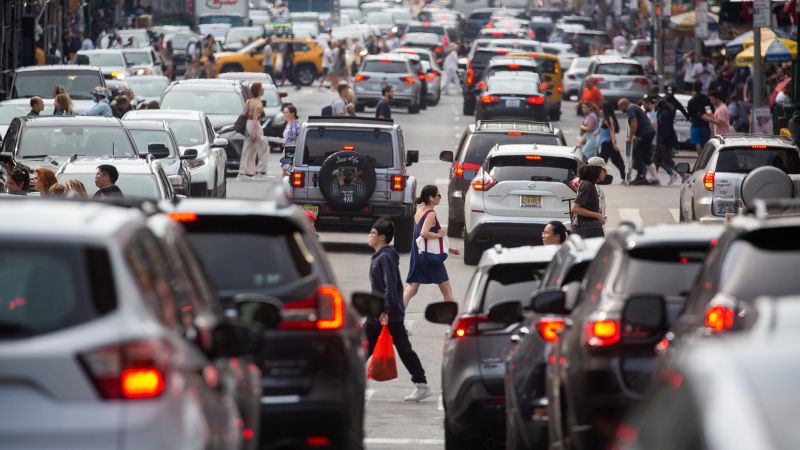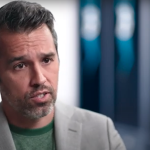CNN
—
New York Governor Kathy Hochul announced Wednesday she is indefinitely delaying the implementation of congestion pricing in New York City’s borough of Manhattan just weeks before the plan was set to take effect, dealing a major blow to transportation advocates who have spent decades pushing for the deal and a win for several opponents of the plan who say the toll is a regressive tax on commuters.
“After careful consideration I have come to the difficult decision that implementing the planned congestion system risks too many unintended consequences for New Yorkers at this time,” Hochul said during a video briefing from her office in Manhattan.
A source familiar with the Governor’s plan said Hochul pushed for the delay due to concerns about affordability and the potential impact to the city’s post-pandemic economic recovery.
New York’s congestion pricing would have been the first of its kind in the United States. Similar programs have been implemented in London and Stockholm. The New York City version has been years in the making and was scheduled to begin June 30th. As part of the plan, drivers would have paid $15 to enter Manhattan south of 60th street, with commercial vehicles and trucks paying steeper tolls.
A spokesperson for the Metropolitan Transportation Authority, which approved the plan in March and would have been in charge of implementation, declined to comment.
John Samuelsen, international president of the Transport Workers Union which represents many of the city’s transit workers accused Hochul of political malpractice, telling CNN Hochul bowed to pressure.
“This was going to be a disaster for Hochul at the ballot, and the plan is bleeding into the Dem’s efforts to take back the House,” Samuelsen told CNN.
The plan was intended to help raise revenue for critical transportation upgrades and maintenance. Over the years it would have helped improve the city’s old subway system and improve other public transit options around the city and its surrounding communities.
According to a second source familiar with the Governor’s plan, Hochul believes the timing of the implementation is not ideal, and believes its implementation would deter commuters from returning to Manhattan’s central business district.
Congestion pricing has been fiercely opposed by some members in the state legislature and New York’s congressional delegation, including some who represent districts outside the five boroughs and worry the toll will result in political backlash from their constituents in a crucial election year, which was part of the governor’s calculus in opting for the delay, the sources said.
Members of the State legislature are expected to be briefed throughout the day, according to two sources.
City Councilmember Joe Borelli, a Republican who represents parts of Staten Island where the plan is deeply unpopular, said the governor’s decision was blatantly political.
“The political calculus has always been the same – it was going to pay off poorly for Democrats, this has always been a wildly unpopular proposal that was only supported by a very vocal minority in the city, mainly the anti-car bike bros in the city,” Borelli told CNN.
“Democrats are in a tailspin nationally and now Hochul is flip-flopping on a state-wide poison pill that affects places in the heart of where Democrats need to take back the house – Long Island and the Hudson Valley, where this is hugely unpopular,” he said.
Reaction was quick to pour in Wednesday, including from some members of New York’s congressional delegation. Rep. Ritchie Torres, who represents parts of the Bronx, told CNN he was blindsided by the decision.
Rep. Jerry Nadler, a Democrat who represents crucial districts in parts of Brooklyn where the plan has support, was critical of Hochul’s decision.
“As a longtime champion of Congestion Pricing and the Congressional Representative of a significant portion of the Central Business District (CBD), I am disappointed by reports that Governor Hochul will not implement Congestion Pricing on June 30, as previously planned,” Nadler said in a statement.
House Minority Leader Hakeem Jeffries, who represents a congressional district that largely covers a swathe of southern Brooklyn, sought to take a middle path.
“For years, Leader Hakeem Jeffries has maintained neutrality with respect to the congestion pricing policy debate. Nothing has changed in that regard,” spokesperson Andy Eichar said in a statement.
“To the extent immediate implementation of congestion pricing is being reconsidered, Leader Jeffries supports a temporary pause of limited duration to better understand the financial impact on working class New Yorkers who have confronted a challenging inflationary environment as a result of the pandemic. We will continue to find ways to lower costs for everyday Americans and strengthen mass transportation in New York State,” Eichar added.
Transportation Alternatives, one of the key advocate group which support the plan were critical of the delay.
“Delaying congestion pricing is a slap in the face to the millions of New Yorkers who rely on public transportation every day just to appease the program’s loudest foes. Congestion pricing is a $15 billion lifeline for the MTA – critical funding that will be lost if the program is stalled,” the group said in a statement. “The next time your train is late, your bus is trapped in traffic, your subway station is still missing an elevator, you know who to blame: Governor Kathy Hochul.”











